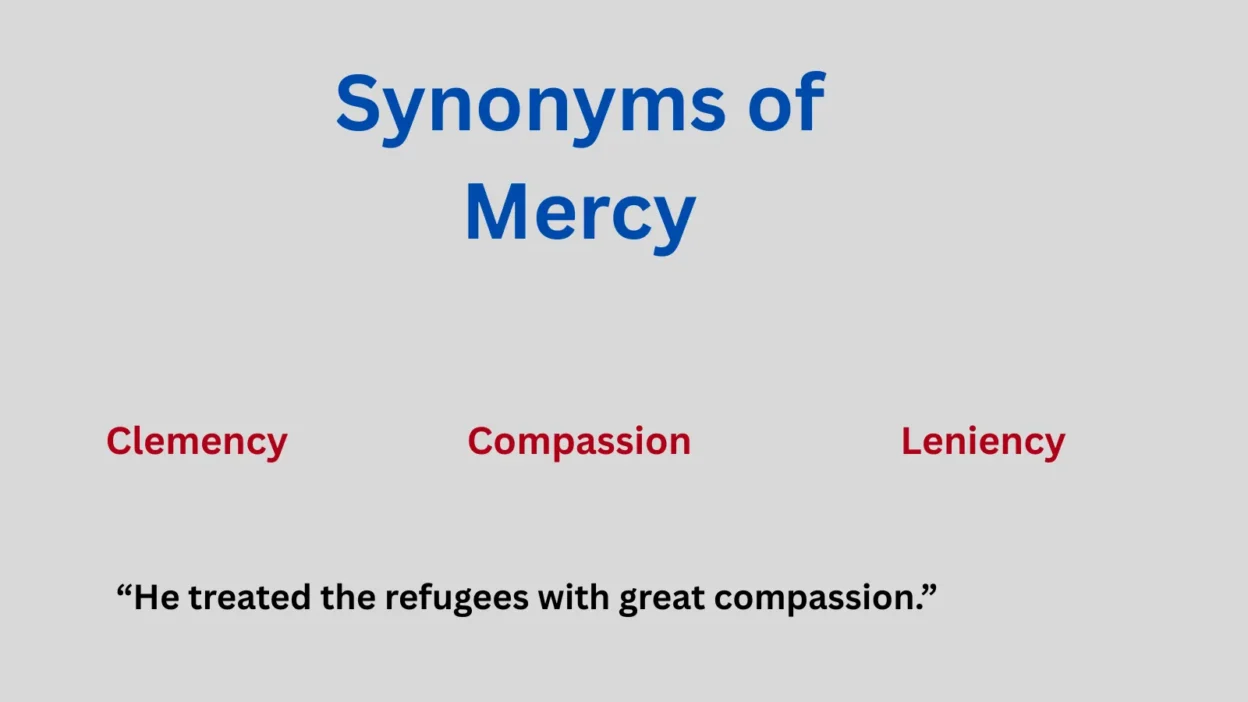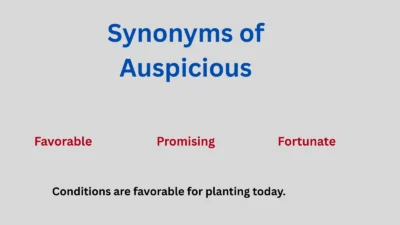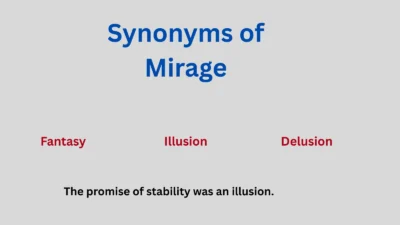Synonyms of mercy, like compassion and clemency, carry deep emotional weight and moral significance, especially in contexts of justice, forgiveness, and kindness. Whether you’re writing a speech, a story, or simply trying to describe an act of grace, the right word can make your message more powerful and heartfelt.
Imagine a courtroom scene: saying the judge showed “mercy” is impactful, but calling it “clemency” gives it a formal, judicial tone, while “compassion” feels more personal and emotional. Each word paints a slightly different picture.
In this guide, we’ll explore over 25 powerful synonyms of mercy, unpacking their meanings, subtle differences, and ideal usage. You’ll also see real-life examples to help you use each word with confidence and clarity.
❤️ What Does Mercy Mean?
Mercy (noun): Compassion shown toward someone whom it is within one’s power to punish or harm.
- Use it when: You’re emphasizing leniency, compassion, or relief in a situation of judgment or suffering.
- “She showed mercy by forgiving him.”
- “The prisoner pleaded for mercy.”
30 Synonyms of Mercy and How to Use Them
1. Compassion
Meaning: Deep sympathy and desire to help.
Use it when: Highlighting emotional empathy.
- “He treated the refugees with great compassion.”
- “Her voice was full of compassion.”
2. Clemency
Meaning: Mercy granted by someone in authority, especially in legal contexts.
Use it when: Referring to formal or legal mercy.
- “The governor granted clemency to the inmate.”
- “She appealed for clemency after the verdict.”
3. Leniency
Meaning: Mild or tolerant attitude, especially in punishment.
Use it when: Talking about relaxed enforcement or punishment.
- “The judge showed leniency due to his age.”
- “He received leniency for confessing.”
4. Forgiveness
Meaning: Letting go of resentment or vengeance.
Use it when: Emphasizing emotional or personal release.
- “Her forgiveness changed his life.”
- “He asked for forgiveness after the betrayal.”
5. Pity
Meaning: Sympathy for someone’s suffering.
Use it when: There’s sorrow for another’s misfortune.
- “She looked at him with pity.”
- “He refused to accept pity.”
6. Charity
Meaning: Generous actions or kindness toward others.
Use it when: Showing mercy through giving or support.
- “Her charity knew no bounds.”
- “They offered charity to the displaced families.”
7. Grace
Meaning: Unmerited favor or kindness.
Use it when: Referring to spiritual or moral generosity.
- “She extended grace to her enemies.”
- “He survived by the grace of God.”
8. Sympathy
Meaning: Understanding or sharing someone’s feelings.
Use it when: You want to express emotional alignment.
- “They expressed sympathy for the victim’s family.”
- “Her face showed genuine sympathy.”
9. Kindness
Meaning: Being considerate and helpful.
Use it when: Highlighting simple, everyday mercy.
- “Her kindness was contagious.”
- “A little kindness goes a long way.”
10. Humanity
Meaning: Compassionate behavior or qualities.
Use it when: Emphasizing shared moral duty.
- “They treated the enemy with humanity.”
- “Show some humanity, will you?”
11. Benevolence
Meaning: The desire to do good or help others.
Use it when: Speaking about good will and generosity.
- “The leader was known for his benevolence.”
- “She offered her benevolence freely.”
12. Kindheartedness
Meaning: A naturally kind or generous nature.
Use it when: Describing personality traits.
- “His kindheartedness won them over.”
- “The kindheartedness of strangers amazed her.”
13. Relief
Meaning: Removal of pain or stress.
Use it when: Mercy involves easing suffering.
- “The medicine brought relief.”
- “He gave them relief from their debt.”
14. Altruism
Meaning: Selfless concern for others.
Use it when: Emphasizing motives without personal gain.
- “His altruism led him to volunteer abroad.”
- “They praised her altruism after the crisis.”
15. Respite
Meaning: A short break from something difficult.
Use it when: Mercy comes as a pause in hardship.
- “The cool breeze brought a welcome respite.”
- “The doctor gave her a respite from treatment.”
16. Indulgence
Meaning: Allowing leniency or tolerance.
Use it when Mercy feels more permissive.
- “She showed indulgence toward his mistakes.”
- “Parental indulgence can spoil children.”
17. Toleration
Meaning: Allowing something you disapprove of.
Use it when: Referring to reluctant or conditional mercy.
- “His toleration of her outbursts was remarkable.”
- “The law calls for toleration, not agreement.”
18. Generosity
Meaning: Willingness to give or share freely.
Use it when: Emphasizing giving as an act of mercy.
- “Their generosity saved the orphanage.”
- “She is known for her generosity of spirit.”
19. Favor
Meaning: An act of kindness or approval.
Use it when: Highlighting selective mercy or privilege.
- “He asked for a favor before the trial.”
- “She granted him a rare favor.”
20. Atonement
Meaning: Reparation for a wrong.
Use it when: Mercy comes after repentance or guilt.
- “He sought atonement for his past.”
- “Through service, she found atonement.”
21. Pardon
Meaning: Official release from punishment.
Use it when: Mercy removes formal consequences.
- “The president issued a full pardon.”
- “He begged for a pardon in court.”
22. Amnesty
Meaning: A general pardon, often political.
Use it when: Talking about legal mercy at a large scale.
- “The government declared amnesty for draft dodgers.”
- “Political prisoners were freed under the amnesty.”
23. Kindliness
Meaning: Gentle and considerate behavior.
Use it when: Highlighting mild, soft-spoken mercy.
- “Her kindliness comforted the children.”
- “He radiated kindliness and calm.”
24. Warmth
Meaning: Emotional kindness and sincerity.
Use it when: Talking about mercy with emotional depth.
- “He treated her with warmth and respect.”
- “Their warmth made everyone feel welcome.”
25. Sensitivity
Meaning: Awareness of others’ feelings.
Use it when: Mercy is thoughtful and attuned.
- “She handled the matter with sensitivity.”
- “His sensitivity to her grief was touching.”
26. Understanding
Meaning: Being empathetic and not judgmental.
Use it when: Mercy involves perspective-taking.
- “She showed great understanding.”
- “They approached the issue with understanding.”
27. Magnanimity
Meaning: Nobility in forgiving insult or injury.
Use it when: Mercy shows strength of character.
- “He showed magnanimity in victory.”
- “Her magnanimity stunned her rivals.”
28. Condonation
Meaning: Overlooking or forgiving a wrong.
Use it when: Speaking in legal or formal contexts.
- “His silence was seen as condonation.”
- “The condonation of misconduct is dangerous.”
29. Salvation
Meaning: Deliverance from harm, ruin, or sin.
Use it when: Mercy has spiritual or life-saving stakes.
- “Faith offered her salvation.”
- “The village saw the doctor as their salvation.”
30. Relenting
Meaning: Becoming less harsh or strict.
Use it when: Describing someone softening.
- “He relented and gave them another chance.”
- “After hours of pleading, she finally relented.”
🧠 Choosing the Right Word for Mercy
✅ Spiritual or Moral Mercy
Use: Grace, salvation, atonement, magnanimity
✅ Legal or Formal Mercy
Use: Clemency, pardon, amnesty, condonation
✅ Emotional Compassion
Use: Compassion, sympathy, kindness, understanding
✅ Everyday Acts of Mercy
Use: Kindheartedness, generosity, favor, warmth
Final Thoughts
Exploring the synonyms of mercy helps us go beyond a single word and embrace the many shades of kindness, compassion, and forgiveness. Words like clemency, leniency, and grace each offer their own nuance, allowing us to tailor our language to the situation, whether we’re writing, speaking, or reflecting.
By understanding the deeper meaning behind these alternatives, we learn to communicate with greater emotional intelligence and clarity.
If in legal settings, personal relationships, or storytelling, using the right synonym of mercy can shift the entire tone.





